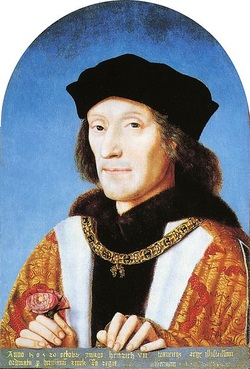Henry VII
(1457-1509)
Title.

Henry VII,also known as Henry Tudor was the first Tudor king after defeating Richard III at the Battle of Bosworth in August 1485. This battle saw the end of the War Of the Roses which had brought instability to England. From 1489 to 1509, Henry VII was the king of England. His second son, also called Henry, inherited the throne and became Henry VIII. Henry VIII and Elizabeth I tend to dominate Tudor history and their lives do overshadow the importance of Henry VII's reign.
The War of the Roses had been a constant battle between two of England's most powerful families-the families of York and Lancanster. He was a memeber of the Lancaster family and soon after he was crowned king, he married Elizabeth of York, to bring the families together.
However, the powerful York family remained a threat to him for years to come as they never recognised their defeat in the War of the Roses nor did they want a member of the Lancaster familly as king of England.
However. Henry was a very difficult opponent.He was a clever man who was determined to not lose his throne. He quickly identified the main problem he faced- the powerful Barons of England. They had their own private armies and they were rich. During the War of the Roses, they had not been loyal to either side- renting out their private armies to the family that paid the most. Henry had to control them. Henry had a three- plan to bring the barons under his control. First, he banned all private armies. Any baron would be commiting treason which carried the death penalty if they disobeyed this royal command. He also heavily taxed the barons to reduce their wealth. The money could be used by Henry to help him build his own royal army. A powerful royal army was an obvious threat to the barons. The third way of controlling the barons was to use the Court of Star Chamber. This was a court run by men who were loyal to Henry and they could be relied on to severely punish any baron who angered the King. With these potential punishments against them, the barons, though a threat to Henry VII, were reasonablly well tamed by him.
When he died in 1509, the country was by past standards wealthy and the position of the king was good. The barons by 1509 had been all but tamed. Many barons believed that was better to work with the king than against such a powerful man.
The War of the Roses had been a constant battle between two of England's most powerful families-the families of York and Lancanster. He was a memeber of the Lancaster family and soon after he was crowned king, he married Elizabeth of York, to bring the families together.
However, the powerful York family remained a threat to him for years to come as they never recognised their defeat in the War of the Roses nor did they want a member of the Lancaster familly as king of England.
However. Henry was a very difficult opponent.He was a clever man who was determined to not lose his throne. He quickly identified the main problem he faced- the powerful Barons of England. They had their own private armies and they were rich. During the War of the Roses, they had not been loyal to either side- renting out their private armies to the family that paid the most. Henry had to control them. Henry had a three- plan to bring the barons under his control. First, he banned all private armies. Any baron would be commiting treason which carried the death penalty if they disobeyed this royal command. He also heavily taxed the barons to reduce their wealth. The money could be used by Henry to help him build his own royal army. A powerful royal army was an obvious threat to the barons. The third way of controlling the barons was to use the Court of Star Chamber. This was a court run by men who were loyal to Henry and they could be relied on to severely punish any baron who angered the King. With these potential punishments against them, the barons, though a threat to Henry VII, were reasonablly well tamed by him.
When he died in 1509, the country was by past standards wealthy and the position of the king was good. The barons by 1509 had been all but tamed. Many barons believed that was better to work with the king than against such a powerful man.
